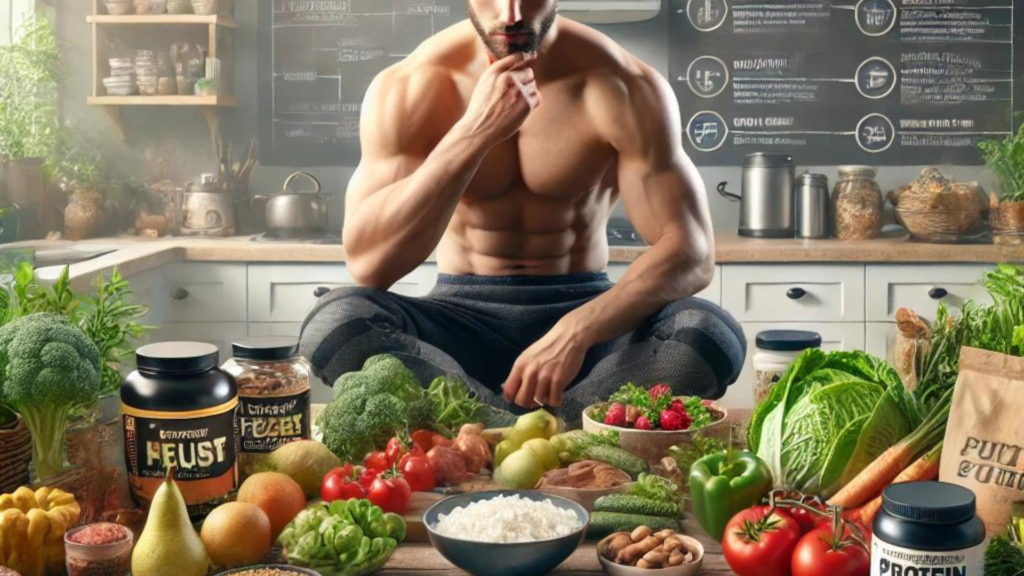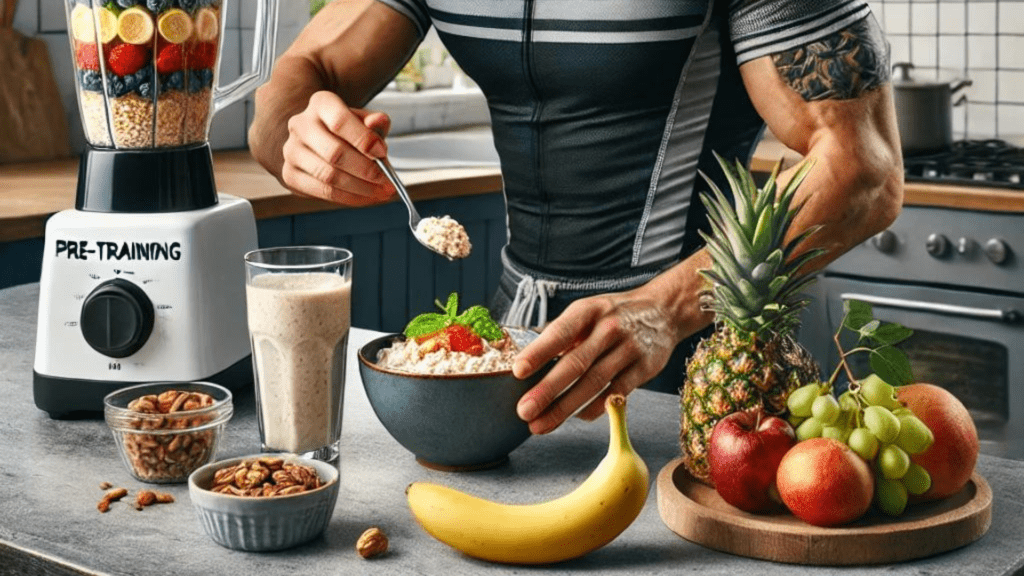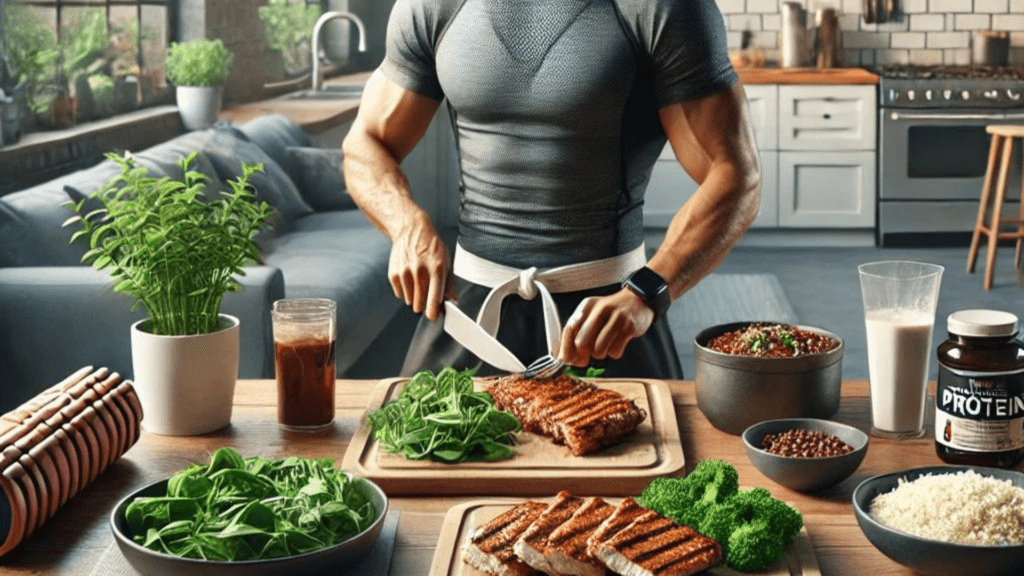Table of Contents
Introduction
Proper nutrition is crucial for martial artists, providing the energy and nutrients needed for intense training and recovery. A well-balanced diet enhances performance, supports muscle growth, and boosts overall health. In this guide, we’ll explore the essential nutrition principles for martial artists and provide an example full day of eating to help you fuel your training effectively.
The Importance of Nutrition for Martial Artists
Energy and Performance
Martial arts training demands high energy levels. Consuming the right balance of carbohydrates, proteins, and fats ensures you have the stamina and strength to perform at your best. Carbohydrates provide quick energy, proteins support muscle repair and growth, and healthy fats are essential for long-term energy and cellular function.
Recovery and Muscle Growth
Intense training sessions cause muscle breakdown. Adequate protein intake helps repair and build muscle tissues, while carbohydrates replenish glycogen stores. Vitamins and minerals play a vital role in recovery, reducing inflammation and supporting immune function.
Overall Health
A balanced diet promotes overall health and well-being. Proper nutrition supports a healthy immune system, enhances mental clarity, and reduces the risk of injuries. Hydration is also key, as even slight dehydration can negatively impact performance.
Essential Nutrients for Martial Artists
Carbohydrates
Carbohydrates are the primary energy source for martial artists. Focus on complex carbs such as whole grains, fruits, and vegetables. These provide sustained energy and essential nutrients.
Proteins
Proteins are crucial for muscle repair and growth. Include lean sources such as chicken, fish, eggs, beans, and tofu in your diet. Aim for a protein-rich meal or snack within 30 minutes post-training.
Fats
Healthy fats are necessary for long-term energy and cell function. Incorporate sources like avocados, nuts, seeds, and olive oil. Avoid trans fats and limit saturated fats.
Vitamins and Minerals
Vitamins and minerals support various bodily functions, including immune response and bone health. Ensure a diverse diet rich in fruits, vegetables, nuts, and seeds to meet your micronutrient needs.
Hydration
Staying hydrated is essential for optimal performance. Drink plenty of water throughout the day, and consider electrolyte-rich beverages during intense training sessions.
List of Foods to Eat
Carbohydrate-Rich Foods
- Whole grains: Brown rice, quinoa, oats, whole wheat bread
- Fruits: Berries, apples, bananas, oranges
- Vegetables: Sweet potatoes, carrots, broccoli, spinach
- Legumes: Lentils, chickpeas, black beans
Protein-Rich Foods
- Lean meats: Chicken breast, turkey, lean beef
- Fish: Salmon, tuna, cod
- Plant-based proteins: Tofu, tempeh, edamame
- Dairy: Greek yogurt, cottage cheese, milk
- Nuts and seeds: Almonds, chia seeds, sunflower seeds
Healthy Fats
- Avocado
- Nuts: Walnuts, almonds, cashews
- Seeds: Flaxseeds, chia seeds
- Oils: Olive oil, coconut oil
- Fatty fish: Salmon, mackerel
Vitamins and Minerals
- Dark leafy greens: Kale, spinach, Swiss chard
- Citrus fruits: Oranges, grapefruits, lemons
- Berries: Blueberries, strawberries, raspberries
- Cruciferous vegetables: Broccoli, cauliflower, Brussels sprouts
- Nuts and seeds: Pumpkin seeds, sunflower seeds
Example Full Day of Eating for Martial Artists
Breakfast
Oatmeal with Fresh Berries and Almond Butter
- 1 cup of oatmeal
- 1/2 cup of fresh berries (strawberries, blueberries, or raspberries)
- 1 tablespoon of almond butter
- 1 teaspoon of honey (optional)
Why It’s Good: Oatmeal provides complex carbohydrates for sustained energy, while berries are rich in antioxidants. Almond butter adds healthy fats and protein.
Mid-Morning Snack
Greek Yogurt with Honey and Walnuts
- 1 cup of Greek yogurt
- 1 teaspoon of honey
- A handful of walnuts
Why It’s Good: Greek yogurt is high in protein and probiotics. Walnuts provide healthy fats and additional protein, while honey adds a touch of natural sweetness.
Lunch
Grilled Chicken Salad
- 4 oz. of grilled chicken breast
- Mixed greens (spinach, arugula, and kale)
- Cherry tomatoes, cucumbers, and bell peppers
- 1/4 avocado
- Olive oil and balsamic vinegar dressing
Why It’s Good: This salad offers a balance of lean protein, healthy fats, and a variety of vitamins and minerals from the vegetables.
Afternoon Snack
Apple Slices with Peanut Butter
- 1 apple, sliced
- 2 tablespoons of peanut butter
Why It’s Good: Apples provide quick energy from natural sugars, while peanut butter offers protein and healthy fats.
Dinner
Quinoa and Vegetable Stir-Fry with Tofu
- 1 cup of cooked quinoa
- Mixed vegetables (broccoli, bell peppers, carrots, and snap peas)
- 4 oz. of tofu, cubed
- Soy sauce and sesame oil for flavor
Why It’s Good: Quinoa is a complete protein and provides complex carbs. Tofu adds additional protein, and vegetables supply essential vitamins and minerals.
Evening Snack
Protein Smoothie
- 1 scoop of protein powder
- 1 banana
- 1 cup of spinach
- 1 tablespoon of chia seeds
- 1 cup of almond milk
Why It’s Good: This smoothie aids in muscle recovery and provides a nutrient-dense option to end the day.
Tips for Maintaining a Balanced Diet
Meal Prepping
Prepare meals in advance to ensure you have healthy options readily available. This helps avoid the temptation of fast food or unhealthy snacks.
Listening to Your Body
Pay attention to how your body responds to different foods. Everyone’s nutritional needs are unique, so adjust your diet based on your training intensity, recovery, and overall health.
Consulting a Professional
Consider consulting a nutritionist or dietitian who specializes in sports nutrition. They can provide personalized guidance to optimize your diet for martial arts training.
Conclusion
Proper nutrition is a cornerstone of success for martial artists. By following a balanced diet rich in essential nutrients, you can fuel your training, enhance your performance, and support your overall health. Use this guide and example full day of eating to start fueling your martial arts journey effectively.
Are you ready to optimize your nutrition for martial arts training?
Start incorporating these dietary tips and meal ideas into your routine. Share your favorite meals and nutrition tips in the comments below!
External Links:



